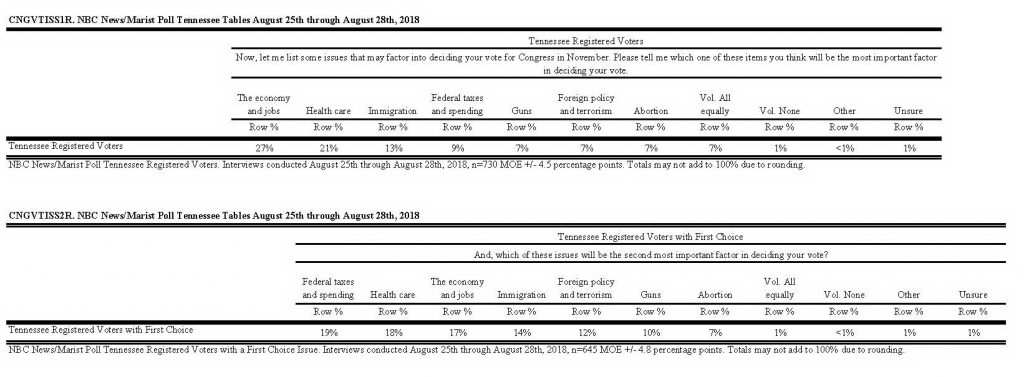September 7, 2018
Tennessee Senate & Governor Race, Sep 2018
NBC News/Marist Poll
Fueled by men and those over the age of 45 Tennessee voters say they prefer a Congress controlled by Republicans. By an eight-point margin Republicans also have the advantage over the Democrats in the generic ballot question. Despite the current Republican advantage in the state, Democrat Phil Bredesen and Republican Marsha Blackburn are in a dead heat among likely voters statewide in the contest for U.S. Senate.
Republican Bill Lee has a 13-point lead over Democrat Karl Dean among likely voters in the contest to fill the seat of term-limited Governor Bill Haslam.
By an 11-point margin registered voters tell the NBC News/Marist Poll they prefer a Congress controlled by Republicans (48%) rather than the Democrats (37%). Opinion splinters along age and gender lines. A majority of voters 45 years of age or older (54%) want the Republicans in control. Voters under the age of 45 divide, 44% for the Democrat and 40% for the Republican. A 32-point gender gap exists. While a majority of men (55%) would like the Republicans to remain in control, women divide. 46% prefer a legislative branch controlled by the Democrats while 42% prefer Republican control.
Republicans also have the advantage on the generic ballot question. 49% of voters say they are more likely to support the Republican candidate in their district while 41% favor the Democrat. Again age and gender matter. Majorities of men (56%) and those age 45 or older (55%) support the Republican on the ballot. Half of voters under 45 support the Democrat. Women divide, 48% for the Democrat and 44% for the Republican.
“Trump carried Tennessee by 26 points in 2016, and the state looks red again in 2018 with one possible exception,” says Dr. Lee M. Miringoff, Director of The Marist College Institute for Public Opinion. “Democrats got an unexpected gift with the retirement of Senator Corker and that race is a tossup right now.”
Many voters (72%) in Tennessee consider this year’s midterm elections to be very important including 82% of Democrats, 78% of Republicans, and 64% of independent voters.
Voters divide about the message their ballot will send in November. 48% of registered voters say their ballot will send a message that more Democrats are needed to serve as a check and balance on the power of President Donald Trump. 44% report their ballot will signal more Republicans are needed to push through the president’s agenda. A 32-point gender gap exists. Men are more likely to say their vote will send a message that more Republicans are needed to advance the president’s policies (50%) than a message that more Democrats are needed to serve as a check on the president (37%). Women are more likely to say the opposite. 57% of women report their vote will indicate more Democrats are needed in Congress while 38% say they want more Republicans to support the president’s agenda.
White women with a college degree (52%) are more likely than white women without a college degree (43%) to report their vote will indicate the need to balance Trump’s power. 50% of white women without a college degree say their vote will signal more Republicans need to be elected to advance the Trump agenda.
In the contest for U.S. Senate in Tennessee Bredesen (48%) and Blackburn (46%) are very competitive among Tennessee likely voters including those who are undecided yet leaning toward a candidate. Five percent are undecided.
While most Democrats (97%) support Bredesen, 86% of Republicans support Blackburn. In fact, nearly one in ten Republican likely voters (9%) say they back Bredesen. Independent likely voters divide (49% for Bredesen to 45% for Blackburn).
Bredesen receives majority support from likely voters under the age of 45 (55%) and women (55%). Blackburn garners majority support from those 45 or older (51%) and men (54%).
66% of likely voters with a candidate preference for U.S. Senate in Tennessee strongly support their choice of candidate. 68% of Bredesen’s supporters compared with 65% of Blackburn’s backers have a firm commitment to their choice of candidate.
A majority of Tennessee residents (52%), including 61% of likely voters, have a favorable impression of Bredesen. 20%, including 22% of likely voters, have an unfavorable opinion of him. 29% of residents, including 17% of likely voters, have either never heard of Bredesen or are unsure how to rate him. Only 37% of Tennessee residents have a favorable view of Blackburn, 32% have a negative opinion of her, and 30% have either never heard of Blackburn or are unsure how to rate her. Among likely voters a plurality (46%) have a positive opinion of Blackburn. 36% have an unfavorable one, and 17% have either never heard of Blackburn or are unsure how to rate her.
“The good news for the Democrats is that Tennessee is in play for the Senate for the first time in a long time,” says Dr. Lee M. Miringoff, Director of The Marist College Institute for Public Opinion. “The bad news is that Bredesen’s best age group among likely voters, those under thirty, are least likely to be energized about this fall’s elections.”
In Tennessee’s gubernatorial contest. Lee (53%) leads Dean (40%) by 13 points among likely voters statewide including those who are undecided yet leaning toward a candidate. Seven percent are undecided.
62% of likely voters with a candidate preference for governor say they strongly support their choice of candidate. 64% of Lee’s supporters and 59% of Dean’s backers say they strongly support their candidate.
27% of registered voters cite the economy and jobs as the most important factor in deciding their vote this November. Health care follows with 21% and 13% mention immigration. Health care (35%) is the top issue among Democrats while the economy and jobs is the most important issue for Republicans (33%). Among independents 25% cite health care while 24% mention the economy and jobs.
Among voters with a top issue choice, 19% say federal taxes and spending is the second most important issue in determining their vote. 18% mention health care, and 17% cite the economy and jobs.

The plurality of Tennessee adults (39%) say raising tariffs and barriers on foreign imports will raise the cost of consumer goods and hurt the U.S. economy. 28% think the increase will protect American jobs and help the U.S. economy. 16% do not believe raising tariffs and barriers on foreign imports will have an effect on the U.S. economy.
Unlike the president’s national standing, Trump’s approval rating is right side up in Tennessee. 45% of adults statewide approve of the job President Trump is doing in office. This includes 28% who strongly approve of the president’s job performance. 40% disapprove, including 32% who strongly do so. 15% are unsure.
45% of Tennesseans have a favorable opinion of President Trump, 45% have an unfavorable opinion of him, and 10% are unsure.
Complete September 7, 2018 NBC News/Marist Poll Release of Tennessee
Complete September 7, 2018 NBC News/Marist Poll of Tennessee (Tables of Likely Voters)

